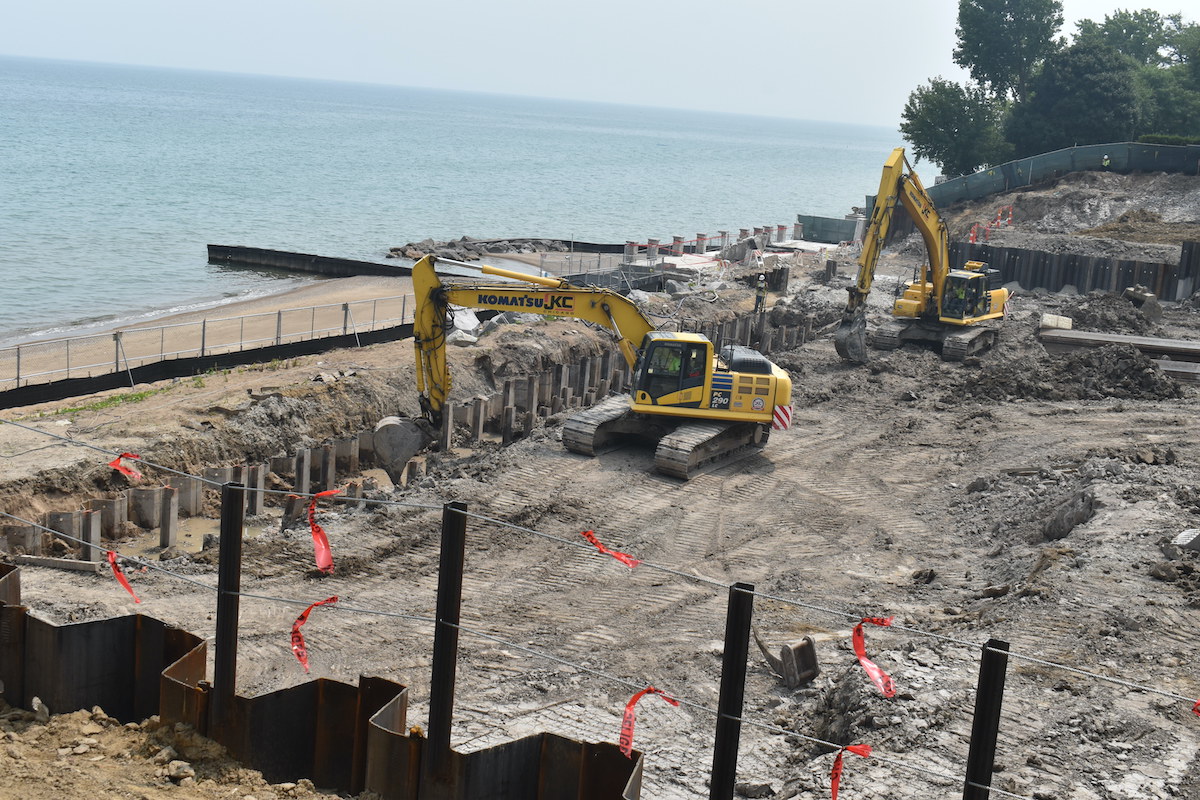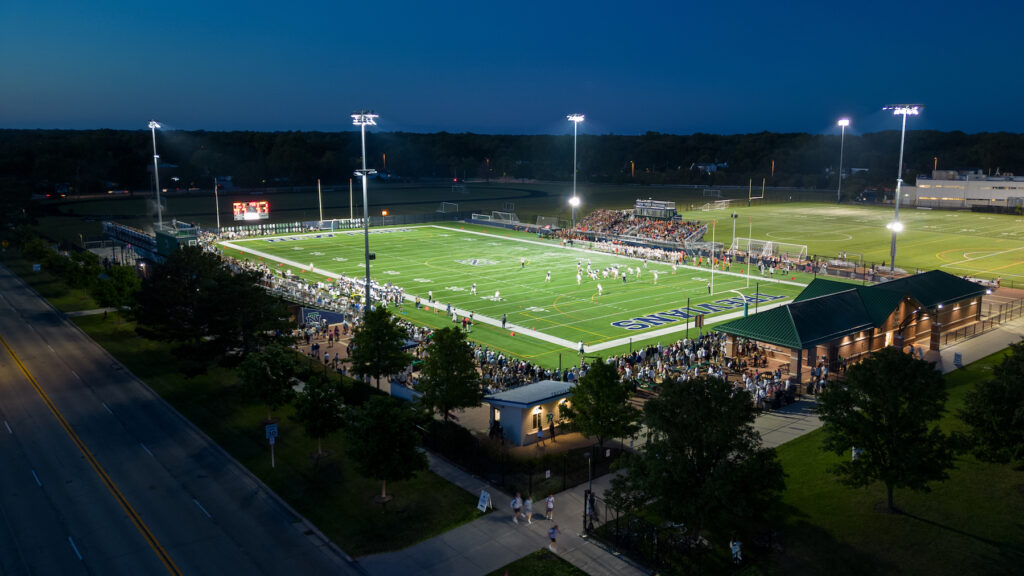
Winnetka council trying to thread the needle of bluff protection and property rights
Winnetka officials are facing a wave of challenges as they craft potential regulations and zoning amendments for developments related to properties along the lakefront.
Trustees dedicated three-plus hours of a Wednesday, Sept. 12 study session to reviewing and discussing how to regulate, if at all, future developments on or near the bluffs of Lake Michigan.
Winnetka’s Village Council first explored the issue earlier this year during a January session when officials reviewed what is allowed under Winnetka’s current zoning regulations on lakefront properties and what other North Shore communities may allow on lakefront properties that contain bluffs, as previously reported by The Record.
The council’s deep dive into potential new development regulations was largely prompted by the ongoing, substantial project involving lakefront land owned by Justin Ishbia along Sheridan Road. As previously reported by The Record, Ishbia and his family are combining four Sheridan Road lots and razing three structures and build one massive property across the stretch of the land.
While trustees struggled on Sept. 12 to reach a clear conclusion and provide village staff with definitive direction, the council members did agree on what many members described as a desire to “close the gaps” in Winnetka’s zoning ordinance related to lakefront developments.
Much of what trustees attributed as the “gap” in Winnetka’s zoning regulations along the lakefront relates to property lines and their correlation to the water’s edge and an existing lack of bluff regulation.
The development at 205 Sheridan Road spearheaded by the Ishbia family found a way to utilize these gaps, allowing a project with what trustees would consider unfavorable circumstances, including a large scale, noticeable neighborhood impact and less desirable treatment of the bluff to proceed forward.
“The fact of the matter, as evidenced on what has gone on the past six months or so, is we have a gaping hole in the zoning (ordinance),” Trustee Bob Dearborn said.
“What happened down there is a catalyst for these conversations,” Dearborn added. “We can’t ignore it. … We have been presented with an issue that is a gap in our process. I think we need to fix it.”
Trustee Rob Apatoff shared similar sentiments, noting the village is “the last line of defense for protecting the shoreline.”
“It wasn’t a gap, it was a gap that you could drive a truck through in our ordinance with what happened at 205,” Apatoff said. “I think some common sense revisions will help us get there without penalizing the people that we don’t want to penalize, which is most of the lakefront owners.”
The conundrum that Apatoff highlighted was the quintessential question that trustees grappled with all evening: How do they develop regulations that prioritize good stewardship to the environment and curb potentially eco-harming lakefront development, like 205 Sheridan, while also remaining true to Winnetka’s long-standing commitment to property owners’ rights?
Council member Kirk Albinson offered a summation of that quandary toward the end of the discussion, giving staff some direction of the board’s feelings while also noting the difficulty and care needed to move forward.
“Maybe the challenge to staff, to keep it super vague and tough, is how can we create an environment where we’re truly leaving it better than we found it and what would that entail,” he said. “And that’s really high-level conceptual thinking but that’s where my head is at.
“I think that appeases all parties. We’re satisfying truly being good stewards to the environment but also trying to stay to the true tune of who Winnetka is and focused on property rights and I think that’s something everyone can embrace.”
The council seemingly shifted from a more hard-lined mindset regarding lakeshore development than it expressed during the January session toward a more nuanced and open view during the Tuesday meeting. But it’s also clear there’s some discrepancies among trustees regarding the scope of the regulations.
Several board members noted a desire to completely halt certain undesirable bluff treatments like what occurred with the 205 Sheridan development but others noted that could encroach on property owner’s rights as long as any work done on or near the bluff is done fully to code and with sound engineering.
‘I don’t think any of these regulations are needed’
Winnetka trustees also heard from several lakefront property owners, all of whom expressed sharp opposition toward more regulations along the shore.
“I don’t think any of these regulations are needed,” said resident John A. Edwardson, who lives on Sheridan Road. “In viewing how all of this originated … it seems like most of the action driving this has been coming from people who don’t live on the lake rather than those who do live on the lake.”
Edwardson, along with several of his neighbors, argued that lakefront property owners have been excellent stewards of the lake and have spent significant resources to protect the bluffs.
“I think if there were really big issues on the lake, you would have been hearing about them from neighbors of people who are causing those big issues,” he said. “The homeowners have been spending the money. We’ve protected the bluffs, and we think we’ve done a pretty good job. We don’t think we need any more regulation from you to continue to do the job to keep our properties safe.”
Leann Pope, who also lives on Sheridan, asked the council to be specific about its purpose with regulations if it plans on moving forward.
“While I understand that all of this got started because of the Ishiba property, steep slope regulations are not going to undo that harm,” she said.
Similar to Edwardson, Pope detailed the strong stewardship of the existing property owners.
“I don’t know of any lakefront owners who have not been good stewards to their property,” she said. “I have seen the protections that have gone up. I have seen the revetments. I have seen the millions spent. I have spent the millions of dollars to protect property. And when you go up and down the shore, maybe some of the homes aren’t to your liking, but they’re protecting the bluffs. And this village, many, many years ago — generations ago — decided that the majority of the lakefront property in Winnetka is going to be the responsibility of private home owners.”
Pope concluded by asking the council to close gaps with a focus on protection of adjacent properties.
“If there are gaps in our existing rules and regulations, engineering gaps, safety and soundness gaps, then those should be filled,” she said. “But for the purpose of protecting adjacent property, not for the purpose of trying to impose on lakefront homeowners an environment in a way that you’d like to see it change.”
Finding a balance
Winnetka Village President Chris Rintz distanced himself from much of the early discussion regarding a path forward, allowing his fellow trustees to lead the conversation. But Rintz offered his thoughts toward the end of the session, noting a similar desire to strike a balance between property owners’ rights and preventing similar developments like 205 Sheridan.
“There are two sides to this certainly,” Rintz said, noting that the challenge is “trying to find that sweet spot where we can actually do what is necessary to not have 205 happen again” while simultaneously keeping in mind that the council doesn’t “want to crap all over the people who have lived down there and who have been doing a wonderful job forever.”
Rintz noted that if trustees are too broad in developing an ordinance, it could lead to unforeseen instances of limiting developments that weren’t meant to be limited. He prompted his peers to work toward more “focused, targeted and specific” priorities.
Village staff will focus on exploring ways to add more context “on a number of zoning issues,” Village Manager Rob Bahan said.
“There’s a lot of challenges to process after tonight,” he said. “Of course, we’ll take a look at all the potential options.”
Winnetka has long upheld less stringent regulations for developments along the lakefront than its neighbors. A portion of Tuesday’s session was devoted to reviewing steep slope regulations in the neighboring communities of Glencoe and Kenilworth.
Trustees made it clear they will look to their neighbors’ ordinances for guidance and best practices but it’s still a priority to maintain property owners’ rights.
The Record is a nonprofit, nonpartisan community newsroom that relies on reader support to fuel its independent local journalism.
Become a member of The Record to fund responsible news coverage for your community.
Already a member? You can make a tax-deductible donation at any time.

Martin Carlino
Martin Carlino is a co-founder and the senior editor who assigns and edits The Record stories, while also bylining articles every week. Martin is an experienced and award-winning education reporter who was the editor of The Northbrook Tower.


